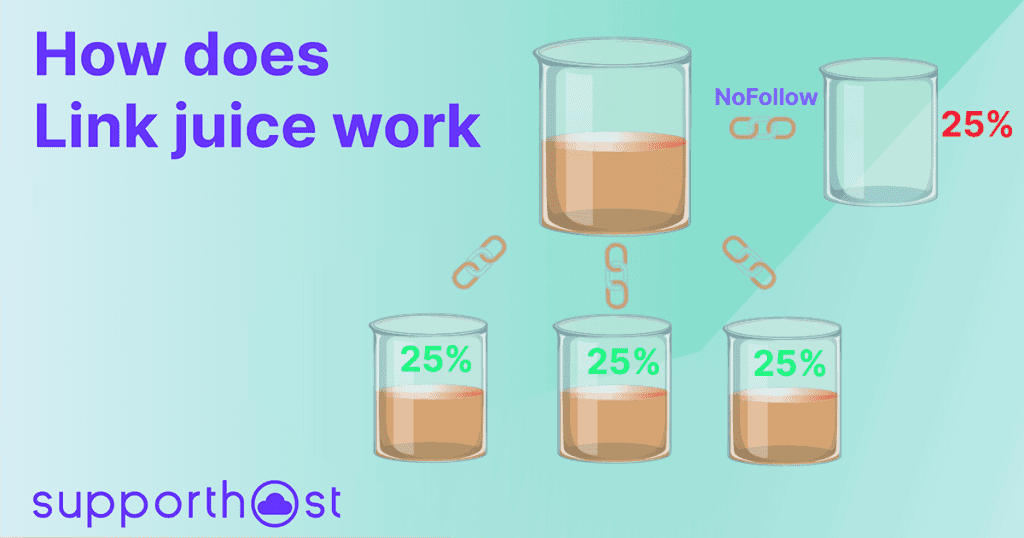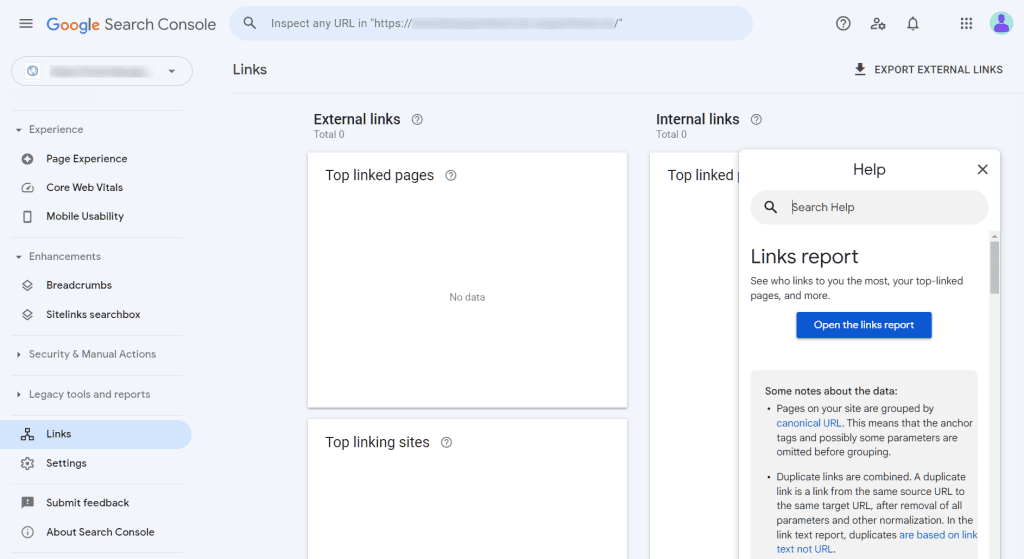In this article, Link juice: what it is and its SEO importance, we will see what is link juice and through it, how you can improve the positioning of your site.
We will see how much the concept of link juice counts, in terms of positioning and what mistakes should be avoided in order not to lose the advantages of this strategy. In the article, Link juice: what it is and its SEO importance, I will also show you what tools to use to better manage link juice and evaluate the relevance of websites.
Let’s start from the beginning and let’s see what link juice means.
Table of Contents
Link juice: what it is
The term Link Juice refers to the value that is transmitted from one web page to another through links.
Therefore, the links between the two pages allow benefits in terms of authority. This means that according to these links the positioning of pages in search engines varies.
However, it should be pointed out that not all links have the same value. Moreover, apart from the number of links other factors should be taken into consideration as well. Let’s take a closer look at what link juice is all about.
How does Link juice work
Each page has a number of links to other pages. In some cases these are internal links pointing to the same domain, in others, they are links pointing to other sites.
Each of these links brings with it a certain value, not only to the single destination page but also to all the others linked to it.

The value that the link brings with it, therefore, is the juice, which just like a liquid is distributed among the different web pages that are linked together. It’s a bit like pouring a liquid into a cascade of glasses and distributing it from the top glass to the ones below.
Assume we have a page with only one incoming link, this link carries a certain amount of value, which we will call juice. However, the amount of juice associated with a link varies depending on the source page of the link.
If only one link starts from the source page, then all the juice will be channeled into that link. If, on the other hand, more than one link starts, it will be distributed among these links and each page will have only a part of the juice.
But what kind of links are we talking about?
Both internal links and backlinks are able to bring value to a page in terms of popularity and positioning (page rank). This means that link juice will depend equally on both internal links between pages on the same site and links from other sites.
Before analyzing internal and external links in detail, let’s make a brief statement about the authority of websites.
Authority of a site
In terms of ranking, every site has a certain authority, often referred to as “site authority” or “domain authority.”
It is not clear in what terms this authority translates into a ranking factor, as the algorithms used by search engines are not known. Therefore, it is not possible to determine precisely how this factor is calculated and what impact it has on search engine results.

Several SEO tools such as Moz’s Domain Authority, the Domain Rating provided by Ahrefs or SEOZoom’s Zoom Authority offer this function.
The measures provided by such tools cannot be considered in absolute terms and each of them relies on different factors to perform the analysis.
Let’s see what the parameters are generally based on:
- the presence of backlinks and their quality
- the evaluation of the site content
- popularity in terms of traffic
- the optimization of the site itself and its consideration in terms of positioning
- the growth potential
As you can easily guess, tools of this type can provide an estimate. It is not easy to establish all these parameters exactly.
For example, it is not always easy to distinguish spam links from those that are really considered reliable. That’s why some of these tools exclude external links from the analysis.
Let’s take a closer look at the importance of internal links and backlinks in terms of link juice.
Internal links
Search engines appreciate the presence of links within a web page and this applies to both internal links and backlinks.
Often, however, there is a tendency to focus all the attention on links coming from other sites and to neglect internal links.
Internal links, in fact, should be taken care of as much as external ones. First of all, because they allow users to continue to navigate from one page to another while remaining on the same site.
And then when it comes to link juice, linking pages to each other increases their value, so it becomes even more important to implement this strategy for internal site links.
But how do you do this effectively?
As with content creation, to best manage internal links you must always start with keyword research. From the analysis of the keywords used, you can outline the relevance between different topics.
By grouping the keywords by themes, you can easily link the different pages to each other. Keywords can also be used as anchor text, the string of words used to position the link.
You should be careful, however, not to use the exact keywords too frequently as anchor text to avoid being penalized by search engines for spam. So how do you avoid this? By also using synonyms and not always dry keywords.
Backlink
The activity of link building allows you to get backlinks, these are links from other sites and directed to ours. There are several ways to get backlinks.
First, you can aim to get them spontaneously. If our content will be considered of interest, some users may want to refer to them and the links will, therefore, come on their own.
Another way to get backlinks is to use guest posts. By doing so you offer to write content to be published on someone else’s site and receive a link to your own site in return.
It is not necessary to specify that the site must have content relevant to our business. Moreover, in order to have a greater yield from the links coming from other sites, the best thing is to direct them to pages such as the homepage of the site.
In this way the value of the link will be distributed towards the pages linked to the home page, which is the most relevant pages of the website.
The guest post-activity should not be confused with the purchase of links. In this case, in fact, it is necessary to be careful so that the sites are always reliable. If the activity would be considered spam, search engines could penalize the site that receives unreliable links.
Factors that influence link juice
Let’s see what strategies you can implement to improve your site’s organic ranking through link juice and what mistakes to avoid.
Nofollow links
To bypass link juice and try to channel value to specific content, a technique called pagerank sculpting was used. This strategy consisted in using the nofollow link for pages towards which you did not want to direct the authority.
The goal was, therefore, to direct this authority towards specific links, namely those where nofollow was not used.
However, with the updates of the algorithms used by Google, this technique is no longer effective. In fact, the value that is transmitted from one page to another is completely lost when the link is nofollow.
This means that all links are still considered, but the “percentage” that would be attributed to the nofollow ones, instead of being redistributed among the others is wasted.
404 Errors
As your blog or site expands there will be more and more links connecting pages to each other. If you happen to delete a page you need to make sure you also remove any links on the site that link back to it.

If you don’t, the user who goes to click on the link will run into a 404 error. But it’s not just visitors to your site who will have to ” pay the damages “.
As long as that link remains, despite the error, some of the link juice from the source page is still sent to the page not found. This means it is completely wasted when it could be redistributed among others.
Duplicate content
If there is similar content on different pages on your site, Google and other search engines may consider the pages to be duplicates. This means that only one of the two pages will be chosen to be shown in the search results and normally this choice will be done automatically.
That’s why in the case of URLs considered duplicate, you can choose which of the two pages you want to have indexed. Just set the one you want to be considered as the canonical URL.

An example of duplicate content can be given by ecommerce, pages, in this case, you have to set URL parameters from Google search console. You can see how to do this in our guide on how to analyze content hidden from search engines.
If, on the other hand, you have made changes or moved your site, changing the URLs, you need to set up 301 redirects. In this way, both visitors to your site and the search engines themselves will be able to reach the new pages correctly.
Disavow
Link juice is like a double-edged sword, you may receive benefits from incoming links from authority sites, but you may also receive backlinks from spam sites.
In most cases, search engines are able to distinguish reliable links from those that are not. However, if this does not happen, these links can damage the reputation of your site in the eyes of Google.
These cases are quite restricted, but if it happens, you can reject these incoming links through the tool Reject link (disavow link) of Google.
Link Juice: useful tools
As we’ve seen for link juice all incoming links on pages are important. To keep track of internal and external links pointing to your website you can use several tools.
The first help comes from Google Search Console that through the link section shows you the number of internal and external links of your site showing which pages are the most linked.

If you have a site with WordPress you can also take advantage of plugins for SEO. Rank Math for example gives you an overview of the relationship between external and internal links pointing to your pages.
For the analysis of backlinks, there are many other tools (also free) including those offered by Neilpatel and Ahrefs. Analyzing your site’s backlinks is one of the fundamental steps for SEO audit of your site.
Conclusion
In this article,Link juice: what it is and its SEO importance, we have seen how link juice is able to strengthen the authority of a website. As you’ve seen, the benefits come from external and internal links.
By adopting the right techniques to manage links between your site’s pages and those coming from other domains, you can reap numerous benefits in terms of ranking right through link juice.
Fortunately, to control the backlink profile of a site and for internal links, we have several tools to help us. How about you? What measures do you use for your site? Let me know in the comments below.
In this article, Link juice: what it is and its SEO importance, we will see what is link juice and through it, how you can improve the positioning of your site.
We will see how much the concept of link juice counts, in terms of positioning and what mistakes should be avoided in order not to lose the advantages of this strategy. In the article, Link juice: what it is and its SEO importance, I will also show you what tools to use to better manage link juice and evaluate the relevance of websites.
Let’s start from the beginning and let’s see what link juice means.
Link juice: what it is
The term Link Juice refers to the value that is transmitted from one web page to another through links.
Therefore, the links between the two pages allow benefits in terms of authority. This means that according to these links the positioning of pages in search engines varies.
However, it should be pointed out that not all links have the same value. Moreover, apart from the number of links other factors should be taken into consideration as well. Let’s take a closer look at what link juice is all about.
How does Link juice work
Each page has a number of links to other pages. In some cases these are internal links pointing to the same domain, in others, they are links pointing to other sites.
Each of these links brings with it a certain value, not only to the single destination page but also to all the others linked to it.

The value that the link brings with it, therefore, is the juice, which just like a liquid is distributed among the different web pages that are linked together. It’s a bit like pouring a liquid into a cascade of glasses and distributing it from the top glass to the ones below.
Assume we have a page with only one incoming link, this link carries a certain amount of value, which we will call juice. However, the amount of juice associated with a link varies depending on the source page of the link.
If only one link starts from the source page, then all the juice will be channeled into that link. If, on the other hand, more than one link starts, it will be distributed among these links and each page will have only a part of the juice.
But what kind of links are we talking about?
Both internal links and backlinks are able to bring value to a page in terms of popularity and positioning (page rank). This means that link juice will depend equally on both internal links between pages on the same site and links from other sites.
Before analyzing internal and external links in detail, let’s make a brief statement about the authority of websites.
Authority of a site
In terms of ranking, every site has a certain authority, often referred to as “site authority” or “domain authority.”
It is not clear in what terms this authority translates into a ranking factor, as the algorithms used by search engines are not known. Therefore, it is not possible to determine precisely how this factor is calculated and what impact it has on search engine results.

Several SEO tools such as Moz’s Domain Authority, the Domain Rating provided by Ahrefs or SEOZoom’s Zoom Authority offer this function.
The measures provided by such tools cannot be considered in absolute terms and each of them relies on different factors to perform the analysis.
Let’s see what the parameters are generally based on:
- the presence of backlinks and their quality
- the evaluation of the site content
- popularity in terms of traffic
- the optimization of the site itself and its consideration in terms of positioning
- the growth potential
As you can easily guess, tools of this type can provide an estimate. It is not easy to establish all these parameters exactly.
For example, it is not always easy to distinguish spam links from those that are really considered reliable. That’s why some of these tools exclude external links from the analysis.
Let’s take a closer look at the importance of internal links and backlinks in terms of link juice.
Internal links
Search engines appreciate the presence of links within a web page and this applies to both internal links and backlinks.
Often, however, there is a tendency to focus all the attention on links coming from other sites and to neglect internal links.
Internal links, in fact, should be taken care of as much as external ones. First of all, because they allow users to continue to navigate from one page to another while remaining on the same site.
And then when it comes to link juice, linking pages to each other increases their value, so it becomes even more important to implement this strategy for internal site links.
But how do you do this effectively?
As with content creation, to best manage internal links you must always start with keyword research. From the analysis of the keywords used, you can outline the relevance between different topics.
By grouping the keywords by themes, you can easily link the different pages to each other. Keywords can also be used as anchor text, the string of words used to position the link.
You should be careful, however, not to use the exact keywords too frequently as anchor text to avoid being penalized by search engines for spam. So how do you avoid this? By also using synonyms and not always dry keywords.
Backlink
The activity of link building allows you to get backlinks, these are links from other sites and directed to ours. There are several ways to get backlinks.
First, you can aim to get them spontaneously. If our content will be considered of interest, some users may want to refer to them and the links will, therefore, come on their own.
Another way to get backlinks is to use guest posts. By doing so you offer to write content to be published on someone else’s site and receive a link to your own site in return.
It is not necessary to specify that the site must have content relevant to our business. Moreover, in order to have a greater yield from the links coming from other sites, the best thing is to direct them to pages such as the homepage of the site.
In this way the value of the link will be distributed towards the pages linked to the home page, which is the most relevant pages of the website.
The guest post-activity should not be confused with the purchase of links. In this case, in fact, it is necessary to be careful so that the sites are always reliable. If the activity would be considered spam, search engines could penalize the site that receives unreliable links.
Factors that influence link juice
Let’s see what strategies you can implement to improve your site’s organic ranking through link juice and what mistakes to avoid.
Nofollow links
To bypass link juice and try to channel value to specific content, a technique called pagerank sculpting was used. This strategy consisted in using the nofollow link for pages towards which you did not want to direct the authority.
The goal was, therefore, to direct this authority towards specific links, namely those where nofollow was not used.
However, with the updates of the algorithms used by Google, this technique is no longer effective. In fact, the value that is transmitted from one page to another is completely lost when the link is nofollow.
This means that all links are still considered, but the “percentage” that would be attributed to the nofollow ones, instead of being redistributed among the others is wasted.
404 Errors
As your blog or site expands there will be more and more links connecting pages to each other. If you happen to delete a page you need to make sure you also remove any links on the site that link back to it.

If you don’t, the user who goes to click on the link will run into a 404 error. But it’s not just visitors to your site who will have to ” pay the damages “.
As long as that link remains, despite the error, some of the link juice from the source page is still sent to the page not found. This means it is completely wasted when it could be redistributed among others.
Duplicate content
If there is similar content on different pages on your site, Google and other search engines may consider the pages to be duplicates. This means that only one of the two pages will be chosen to be shown in the search results and normally this choice will be done automatically.
That’s why in the case of URLs considered duplicate, you can choose which of the two pages you want to have indexed. Just set the one you want to be considered as the canonical URL.

An example of duplicate content can be given by ecommerce, pages, in this case, you have to set URL parameters from Google search console. You can see how to do this in our guide on how to analyze content hidden from search engines.
If, on the other hand, you have made changes or moved your site, changing the URLs, you need to set up 301 redirects. In this way, both visitors to your site and the search engines themselves will be able to reach the new pages correctly.
Disavow
Link juice is like a double-edged sword, you may receive benefits from incoming links from authority sites, but you may also receive backlinks from spam sites.
In most cases, search engines are able to distinguish reliable links from those that are not. However, if this does not happen, these links can damage the reputation of your site in the eyes of Google.
These cases are quite restricted, but if it happens, you can reject these incoming links through the tool Reject link (disavow link) of Google.
Link Juice: useful tools
As we’ve seen for link juice all incoming links on pages are important. To keep track of internal and external links pointing to your website you can use several tools.
The first help comes from Google Search Console that through the link section shows you the number of internal and external links of your site showing which pages are the most linked.

If you have a site with WordPress you can also take advantage of plugins for SEO. Rank Math for example gives you an overview of the relationship between external and internal links pointing to your pages.
For the analysis of backlinks, there are many other tools (also free) including those offered by Neilpatel and Ahrefs. Analyzing your site’s backlinks is one of the fundamental steps for SEO audit of your site.
Conclusion
In this article,Link juice: what it is and its SEO importance, we have seen how link juice is able to strengthen the authority of a website. As you’ve seen, the benefits come from external and internal links.
By adopting the right techniques to manage links between your site’s pages and those coming from other domains, you can reap numerous benefits in terms of ranking right through link juice.
Fortunately, to control the backlink profile of a site and for internal links, we have several tools to help us. How about you? What measures do you use for your site? Let me know in the comments below.





Leave a Reply